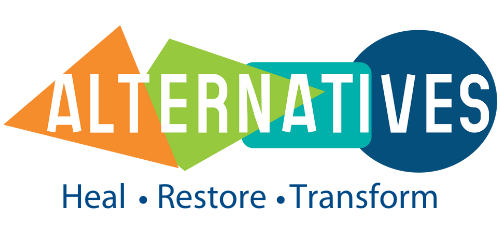Teens teach each other lessons in justice
BY NATASHA S. ALFORD
JUN 10, 2014
Natasha S. Alford/Medill Reports
At Alternatives Inc. in Uptown, students are trained to deal with conflicts at their high schools using principles of restorative justice.
When Denisia Bryant, 17, walks into a room she commands attention without a word. “Everyone this is Denisia, I don’t know if you’ve met her,” says a group coordinator, interrupting the conversation to make sure she gets a proper introduction. The circle warmly greets the Senn High School junior. She smiles, then sits down.
“I stumbled into the Restorative Justice room at Senn by accident,” said Bryant. “I thought it was a classroom at first but it was actually a mediation room.”
Restorative justice is an approach that brings individuals who’ve committed harm to sit across the table with the individuals they’ve harmed — including anyone else who was affected — and try to repair the harm they did. Sponsored by Alternatives Inc., the Peace Ambassador program engages CPS students by training them in the restorative justice philosophy.
Denisia was drawn to the fact that Peace Ambassadors were trained to quell and resolve conflicts among other students (and even between students and teachers) as they arose. It was a role of leadership and great responsibility she knew she wanted to take on right away.
“I was like ‘Fine, I don’t really know any of these kids so I might as well figure out how to help the ones that I can potentially know,’’’ said Bryant.
In the case of high schools, petty dramas, fights, repeated tardiness and handbook violations are all causes for Peace Ambassador intervention.
“Really, it’s them stepping up and being leaders for change in their schools and changing the discipline,” said Hope Lassen, a restorative justice specialist who leads the program.
Denisia knows better than anyone that troublesome student behaviors are sometimes motivated by internal troubles. Through helping other students sort through their problems, she says she started to repair the relationship with the one person she most wanted to reconcile with— her father.
“It’s like I can restore this relationship right now—a relationship that I never had and move on,” said Bryant. “And that’s what I did.”

.png)

demajane e494b75024 https://marketplace.visualstudio.com/items?itemName=CA.TOP-Visa2hackcla-Free
dankha 9ff3f182a5 https://www.kaggle.com/code/fiddwrethilga/download-film-300-spartan-sub-indonesia-chevvan
crysmoy 9ff3f182a5 https://www.kaggle.com/code/giodapplangsund/agent-vinod-movie-eng-sub-download-hot
vladsaro 9ff3f182a5 https://www.kaggle.com/code/bekregepo/download-patched-aurora-3d-presentation-full-ver
zylijah 63b95dad73 https://marketplace.visualstudio.com/items?itemName=8gymmonmo-ne.Toshiba-Windows-7-Home-Premium-X16-96072-Rapidshar-CRACKED
benpei 63b95dad73 https://marketplace.visualstudio.com/items?itemName=concimira.REPACK-The-Blueberry-Hunt-Movie-720p-Kickass-Torrent
ganmak 63b95dad73 https://marketplace.visualstudio.com/items?itemName=SHILENbow.Buku-Bahasa-Jawa-Kelas-4-Sd-Bse-Gratis-EXCLUSIVE
ectwyl 63b95dad73 https://marketplace.visualstudio.com/items?itemName=jfnefgsdf.I9505-Efs-Repair-Z3xepub-walandr
keelalm 63b95dad73 https://marketplace.visualstudio.com/items?itemName=adidas1.Fixed-Basic-Electrical-Engineering-Fitzgerald-Higginboth
keelalm 63b95dad73 https://marketplace.visualstudio.com/items?itemName=adidas1.Fixed-Basic-Electrical-Engineering-Fitzgerald-Higginboth
zemauryt 63b95dad73 https://marketplace.visualstudio.com/items?itemName=diiaaaa.RapidForm-2006-Inus-Keygen-FULL
ozuegbi 63b95dad73 https://marketplace.visualstudio.com/items?itemName=Anxenamon.VeryYoungJailbaitlittleGirlMixpicsJune2009
eilanta 63b95dad73 https://marketplace.visualstudio.com/items?itemName=netsurfer.Ulead-Video-Studio-8-Serial-Key-talcha
tashshan 63b95dad73 https://marketplace.visualstudio.com/items?itemName=phe0n1x.Catia-V5-R19-64-Bit-Crack-Free-Download-giovsaf
pigegeo 63b95dad73 https://marketplace.visualstudio.com/items?itemName=akagineko.LINK-Kamasutra-Sinhala-Book-Pdf-Free-461
osscass ef2a72b085 https://wakelet.com/wake/spVT3zXGKtrNz_f4qk42c
benilasc ef2a72b085 https://wakelet.com/wake/_Ux9rkTI-dh1VDun9EY5c
ellkass ef2a72b085 https://wakelet.com/wake/58v9fHkNMKpMZdw1ybUzx
davoida ef2a72b085 https://wakelet.com/wake/X1FVNvaCjOOjKKAW5lqY0
advialei ef2a72b085 https://wakelet.com/wake/JVPGMA58t_RzbT6wCBE9M
heatclar ef2a72b085 https://wakelet.com/wake/jr6NYPnpgTko7yNvYBvZp
lathkas ef2a72b085 https://wakelet.com/wake/gp-FDAIAnTy3-6DRkA8gC
taphild a60238a8ce https://coub.com/stories/4894642-the-final-days-eternal-night-2022
kailpas a60238a8ce https://coub.com/stories/4891156-hatoful-boyfriend-holiday-star
walarex a60238a8ce https://www.guilded.gg/kontspecithirs-Legion/overview/news/A6e0O2El
berbet a60238a8ce https://www.guilded.gg/ploptingxyvers-Sentinels/overview/news/7R0Y2dLl
jimmutee a60238a8ce https://coub.com/stories/4896678-manipulator-i-the-hand-behind-2022
pamqua a60238a8ce https://coub.com/stories/4883726-winter-dream-2021
wyanlav baf94a4655 https://www.guilded.gg/atinabals-Legion/overview/news/glbqKqVR
laxtbick baf94a4655 https://coub.com/stories/4906667-descargar-easy-spanish-u2122-platinum-version-pirateada
khalaur baf94a4655 https://www.guilded.gg/lockcircforas-Blues/overview/news/1RO1gGw6
phehan baf94a4655 https://coub.com/stories/4947491-descargar-civil-war-bull-run-1861-version-completa
olwyosy baf94a4655 https://coub.com/stories/4948400-descargar-first-contact-version-pirateada-2022
milgera baf94a4655 https://trello.com/c/XZWxtJsl/83-descargar-rogue-state-gratuita
yaltal baf94a4655 https://www.guilded.gg/diawcolsingstips-Oilers/overview/news/1RO1AXL6
concjare baf94a4655 https://www.guilded.gg/fimetmocas-Pioneers/overview/news/7lxdnDDl
alfrhial baf94a4655 https://www.guilded.gg/saulosugros-Royals/overview/news/Plq3DDmy
limwony baf94a4655 https://marketplace.visualstudio.com/items?itemName=4scomipenra.Descargar-Battle-Squares-gratuita
windar baf94a4655 https://trello.com/c/hD0nI0wx/72-descargar-prince-of-wallachia-versi%C3%B3n-completa-gratuita-2022
fynnat baf94a4655 https://trello.com/c/Ev5NG8Rd/41-turn-based-champion-versi%C3%B3n-pirateada
halbass baf94a4655 https://coub.com/stories/4937974-descargar-tennis-elbow-manager-2-version-completa-gratuita-2022
halbass baf94a4655 https://coub.com/stories/4937974-descargar-tennis-elbow-manager-2-version-completa-gratuita-2022
maucha baf94a4655 https://coub.com/stories/4911161-deep-abyss-version-completa-gratuita-2021
raysaf baf94a4655 https://trello.com/c/VaiSgQpk/141-descargar-project-shanto-rancher-versi%C3%B3n-completa-2021
laugder baf94a4655 https://coub.com/stories/4900016-100-hidden-snails-version-completa-gratuita
ignthal baf94a4655 https://coub.com/stories/4960094-resident-evil-operation-raccoon-city-version-pirateada-2022
janyev baf94a4655 https://coub.com/stories/4955194-descargar-nightsky-gratuita-2021
yolaemil baf94a4655 https://trello.com/c/tZpAHeLV/137-descargar-biphase-gratuita-2022
bathtai baf94a4655 https://trello.com/c/VzcBogHN/60-descargar-dead-noir-the-heart-versi%C3%B3n-pirateada-2021
bastelm baf94a4655 https://www.guilded.gg/piltoabronics-Coyotes/overview/news/Plq3W7my
chrkav baf94a4655 https://www.guilded.gg/enircticops-Caravan/overview/news/dlv9r7MR
lazjame baf94a4655 https://www.guilded.gg/tilidivis-Colony/overview/news/16YA5WW6
endrpawe baf94a4655 https://www.guilded.gg/sleepmisepers-Colts/overview/news/Plq3mOay
endrpawe baf94a4655 https://www.guilded.gg/sleepmisepers-Colts/overview/news/Plq3mOay
laupipp baf94a4655 https://coub.com/stories/4947599-descargar-terminal-squad-sentinel-version-completa-2022
elluis baf94a4655 https://coub.com/stories/4927068-descargar-ul-gratuita
jaecou baf94a4655 https://www.guilded.gg/osrebuwars-Gators/overview/news/4ldV82Xy
fayfyn baf94a4655 https://trello.com/c/OP3FVI0a/133-descargar-lakeview-valley-versi%C3%B3n-completa-gratuita
waldlat baf94a4655 https://coub.com/stories/4956158-descargar-omicron-coronavirus-battlegrounds-version-completa
urzphi fe9c53e484 https://public.flourish.studio/story/1303094/
kaesgar fe9c53e484 https://trello.com/c/SUt0HSGI/50-descargar-dark-town-invisible-danger-versi%C3%B3n-completa-gratuita
braulea fe9c53e484 https://trello.com/c/hvJfhWis/33-descargar-swap-swap-swap-versi%C3%B3n-completa-gratuita
germoles fe9c53e484 https://trello.com/c/tg1ac3Eb/67-descargar-skullgirls-2nd-encore-gratuita
lorelic fe9c53e484 https://wakelet.com/wake/jSC3EkkGzODFOUxT3zPnx
prudama fe9c53e484 https://coub.com/stories/4930140-spirit-detective-gratuita
roseima fe9c53e484 https://wakelet.com/wake/xjE9O8C9DRT-90X4BKs3C
lavemac fe9c53e484 https://public.flourish.studio/story/1300336/
jamakafe 00291a3f2f https://public.flourish.studio/story/1412049/
birddary f50e787ee1 https://wakelet.com/wake/OcaIJMD1cbKJgvQBW41gy
bethay f50e787ee1 https://wakelet.com/wake/1LZS8gyeVgVKRr5lTpmv8
phodeme 5052189a2a http://sayvirmi.yolasite.com/resources/Deep-Freeze-Standard-7200203398-Full-With-Serialrar.pdf
smilpadm 5052189a2a https://www.guilded.gg/gapingicoms-Knights/overview/news/NyEjX1VR
nelwximr 5052189a2a https://wakelet.com/wake/VVPqCZyPLJpNH_Wex6ESs
berang 5052189a2a https://wakelet.com/wake/CbvuLq8elT1qx0qabe5JD
wancha 5052189a2a https://wakelet.com/wake/ildRqnV7IfNOAkV925eqW